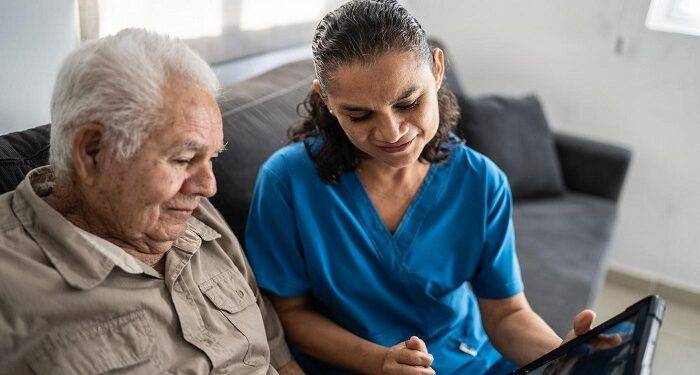Health is a precious commodity that is essential to living a fulfilling and happy life. It encompasses physical, mental and emotional well-being. Health depends upon many factors, such as genetics, lifestyle, environment and access to healthcare.
Maintaining good health is crucial for individuals to function optimally, pursue their goals and aspirations and enjoy life to the fullest. Conversely, neglecting one’s health can lead to various negative consequences, including chronic illnesses, decreased quality of life and premature death. So, individuals need to prioritize their health and take care of it.
To ensure that you are living a healthy life, it is essential to have regular check-ups. For that, we need family nurse practitioners. Family nurse practitioners (FNPs) are registered nurses who have completed advanced education and training in providing primary healthcare services to individuals and families throughout their lives.
FNPs are licensed to diagnose and treat common acute and chronic health conditions, order and interpret diagnostic tests, perform physical exams, prescribe medications and provide preventative care and health education.
The entire healthcare system heavily relies on family nurse practitioners because of their number in the healthcare sector. According to the American Association of Nurse Practitioners (AANP), 70.3% of nurse practitioners specialize in family care.
Family nurse practitioners work collaboratively with patients, families and other healthcare professionals to promote health and prevent disease. They assess, diagnose and treat various health issues, from minor illnesses and injuries to chronic diseases such as diabetes and hypertension.
FNPs also provide patient education and counselling to promote healthy lifestyle choices and manage chronic health conditions. They may work in various settings, including primary care clinics, hospitals, long-term care facilities and community health centers.
The job of an FNP is tough. Despite this, many nurse practitioners opt to become FNPs for greater autonomy and flexibility in their role. Becoming a family nurse practitioner typically involves completing several educational and professional steps. First, an individual has to earn a Bachelor’s degree in nursing from an accredited institution and obtain an active registered nurse license.
After that, to specialize in family care, the nurse must obtain a master’s degree as a family nurse practitioner. Several universities offer this degree. However, one of the most attractive master’s degrees for a family nurse practitioner is offered by Rockhurst University. This university offers affordable online FNP programs that provide complete flexibility to the students enrolled in these programs. To learn more about online FNP programs, click here.
Once the nurse practitioner completes the FNP program, they must obtain a license to practice as an FNP and then they can start practicing. As many people are unaware of the role of family nurse practitioners in the healthcare system, we will be taking a deeper look at some of the roles that FNPs perform.
Recording history of patient’s health
Family nurse practitioners have a role in providing primary care to patients, so they are also responsible for recording patient health histories. This involves gathering information about a patient’s past and current health status, including any significant medical conditions, past surgeries or hospitalizations, family medical history and medication use.
The FNP may collect this information by conducting an in-person interview with the patient, reviewing medical records or speaking with family members or other healthcare providers. Once this information is gathered, the FNP will document it in the patient’s medical record to ensure it is easily accessible and can be used to inform future healthcare decisions.
Recording patient health histories is essential to the FNP’s role as it provides a baseline for assessing a patient’s current health status and identifying any potential health concerns or risks. This information is used to guide the development of a patient’s healthcare plan. In addition, it can help the FNP to monitor the patient’s progress over time. By keeping accurate and up-to-date health records, the FNP can ensure that patients receive high-quality, personalized care tailored to their needs and health status.
Performing physical exams
Performing physical exams is an essential part of the FNP’s role as it provides critical information about a patient’s current health status and helps to identify any potential health concerns or risks. In addition, this information is used to guide the development of a patient’s healthcare plan.
A physical exam is a comprehensive assessment of a patient’s body systems. It can include various evaluations, such as vital signs, body measurements and a head-to-toe examination of different body parts.
During a physical exam, the FNP will use a combination of observation, palpation and other diagnostic techniques to assess the patient’s overall health and identify any potential concerns or health risks. They may also use specialized tools such as stethoscopes, reflex hammers and ophthalmoscopes to evaluate specific body systems and functions.
Order tests and analyze results
Another role of a family nurse practitioner is to order tests and analyze the results to help diagnose and manage a patient’s health conditions. This involves using various diagnostic tools and tests to identify health issues and determine the most appropriate treatment.
After recording a patient’s history and performing physical tests, the FNP orders appropriate tests for further investigations. These may include blood tests, imaging studies and other diagnostic procedures. Once the tests are completed, the FNP analyzes the results to determine if there are any abnormalities or concerns that require further investigation or treatment.
Analyzing test results is a critical part of the FNP’s role, as it allows them to make informed decisions about a patient’s healthcare plan. By evaluating the results of tests and other diagnostic procedures, the FNP can identify potential health concerns and develop a targeted treatment plan tailored to the patient’s needs and health status. This helps ensure that patients receive high-quality, personalized care based on the most up-to-date information about their health status.
Developing treatment plans
A family nurse practitioner is responsible for developing and administering treatment plans after diagnosing a patient’s health condition. This involves using their clinical expertise to determine the most appropriate treatment options based on the patient’s medical history, symptoms and health status.
The FNP may prescribe medications, perform procedures or recommend lifestyle changes to help manage or resolve the patient’s health issue. They will also provide education and guidance to the patient and their family regarding the treatment plan and what to expect during recovery.
The FNP will monitor the patient’s progress throughout the treatment process and adjust the treatment plan to ensure the best possible outcome. Effective communication and collaboration with other healthcare team members is also essential to ensure the patient receives comprehensive and coordinated care.
Communication with families
As a family nurse practitioner, one of the most significant roles is communicating with families and coordinating with patients’ other caregivers. This involves working collaboratively with the patient’s family members and other healthcare professionals to ensure that the patient receives comprehensive and coordinated care.
Effective communication with families is essential for building trust with patients and their loved ones. FNPs communicate important information about the patient’s health status, treatment plan and expected outcomes clearly and concisely. They also provide guidance and support to family members by addressing their concerns and answering their questions.
FNPs ensure that all caregivers involved in the patient’s care know the treatment plan and any changes that are made. They also facilitate communication between caregivers to ensure that everyone works together to provide the best possible care for the patient.
Referring patients to specialists
Consultation is essential while treating patients. Although FNPs are qualified to diagnose and treat a wide range of health conditions, some conditions may require the expertise of a specialist for more specialized care.
FNPs use their clinical judgement to determine when a referral to a specialist is necessary. This may be based on the patient’s medical history, symptoms and response to treatment. For example, referral to a specialist may be necessary for conditions such as cancer, heart disease or mental health disorders.
FNPs work with the patient to find an appropriate specialist to provide the necessary care. They ensure that the specialist can access the patient’s medical records and relevant information, including diagnostic test results and treatment history.
FNPs also provide guidance and support to the patient throughout the referral process, including scheduling appointments and coordinating care between the specialist and the FNP.
After the patient receives care from the specialist, FNPs ensure that they receive follow-up care as needed. This may include additional diagnostic tests or procedures, medication management or ongoing monitoring of their condition.
Why do we need family nurse practitioners?
Over the years, the demand for FNPs has grown. To meet this demand, most nurse practitioners specialize in family care. Have you ever wondered about the reason behind this growing demand for FNPs? Let’s discuss the factors that are causing the demand for FNPs to increase.
Increasing aged population
The population of aging people in the US is increasing. It is predicted that by 2030 the number of people above the age of 65 will increase by 6%. As the Baby Boomer generation is aging, the demand for healthcare services is increasing, and FNPs play an increasingly important role in meeting this demand.
Since older adults often have more complex and chronic health conditions, they require a higher level of care than younger patients. FNPs are well-positioned to provide this care, as they have a strong foundation in primary care and are trained to take a holistic approach to patient care. This includes addressing not only the patient’s physical health needs but also their social, emotional and psychological needs.
In addition to providing primary care services, FNPs are qualified to provide geriatric care services, such as assessing cognitive function, managing medications and addressing age-related changes in vision, hearing and mobility.
The services of FNPs are often preferred by the patients’ families since they support older adults and their families. They also provide education on disease prevention, healthy aging and end-of-life care.
Shortage of physicians
The ongoing shortage of physicians in the United States is another factor that has contributed to the increasing demand for family nurse practitioners. As the demand for healthcare services continues to grow, the number of available physicians has not kept pace, creating a gap in access to care.
FNPs are trained to provide many of the same services as physicians, including diagnosing and managing common health conditions, prescribing medications and ordering diagnostic tests. As a result, they are increasingly being recognized as an essential part of the healthcare workforce, particularly in areas with a shortage of physicians.
In many cases, FNPs collaborate with physicians, providing primary care services and referring them to physicians when specialized care is needed. This collaborative approach allows healthcare providers to work more efficiently and effectively, ensuring that patients receive the care they need in a timely and coordinated manner.
Expensive healthcare
The cost of healthcare services in the United States is rising continuously, making it increasingly difficult for many patients to access care, particularly in underserved areas. As a result, many people lack the necessary healthcare services, which can seriously affect their health and well-being.
Family nurse practitioners are often trained to provide care to underserved populations. They are well-positioned to address this issue by providing high-quality, affordable care to patients who might otherwise go without. FNPs are trained to provide many of the same services as physicians, including diagnosing and managing common health conditions.
Many FNPs work in primary care clinics, community health centers and other healthcare settings that serve underserved populations. These settings often offer care charged on a sliding scale basis according to the patient’s ability to pay, making healthcare services more accessible and affordable for patients with affordability issues. FNPs can also provide education and support to patients and their families, helping them to make informed decisions about their health and wellness.
In addition to providing care to underserved populations, FNPs also help reduce the overall healthcare cost by providing more efficient and effective care. For example, they can provide preventive care services, such as screenings and vaccinations, which can help to prevent more serious and costly health conditions from developing. They can help to manage chronic health conditions such as diabetes that can lead to ED if it remains uncontrolled, in a more affordable manner.
For consultation during the pandemic
The ongoing Covid-19 pandemic has created a significant demand for telehealth services. Many people have been unable or unwilling to visit healthcare providers in person. In this situation, family nurse practitioners have been playing a critical role in providing patient telehealth consultations.
During the pandemic, many FNPs have provided telehealth consultations, education and support to patients and their families. This has helped ensure that patients can receive the care they need, even when they cannot visit a healthcare provider in person.
Need for high-quality care
People always prefer getting individual attention while they are accessing healthcare services. However, that’s not necessarily possible for physicians in a hospital-like environment. However, FNPs provide individual attention to patients by taking care of all their needs, from keeping records to providing emotional support.
Families are also often more comfortable with FNPs. They trust FNPs and develop a family-like bond because they are often willing to provide healthcare service to the patients in their homes and at convenient care centers.
Conclusion
Family nurse practitioners are advanced practice registered nurses trained to provide comprehensive, patient-centered care to individuals and families. Their role is very similar to a physician, which leads to the healthcare system relying heavily on FNPs.
The number of FNPs is significant in the US. Out of all nurse practitioners, almost 70% opt to specialize in family care. This article discusses the process of becoming an FNP. As many people are unaware of the role that FNPs play in their daily lives, this article highlights the roles of an FNP in detail.
For example, an FNP must record the entire history of a patient’s health. This educates the FNP about the patient, based on which they can treat the patient more effectively. FNPs also have to order tests and analyze the results, after which they decide how to prepare the patient’s treatment plan.
Another important job of an FNP is communicating with the patient’s family and acting as a bridge between them and their caregivers. FNPs often need to refer patients to specialists. To do that, FNPs must carefully choose which specialist the patient should be referred to.
The demand for FNPs in the US has increased over the years. Some of the major reasons for this growing demand are mentioned in this article. A significant cause for the increasing demand for FNPs is the rise in the aging population of the US. The shortage of physicians is also causing the demand to surge.
Additional factors, such as expensive healthcare and the need for high-quality care, are also causing the demand for FNPs to increase.









